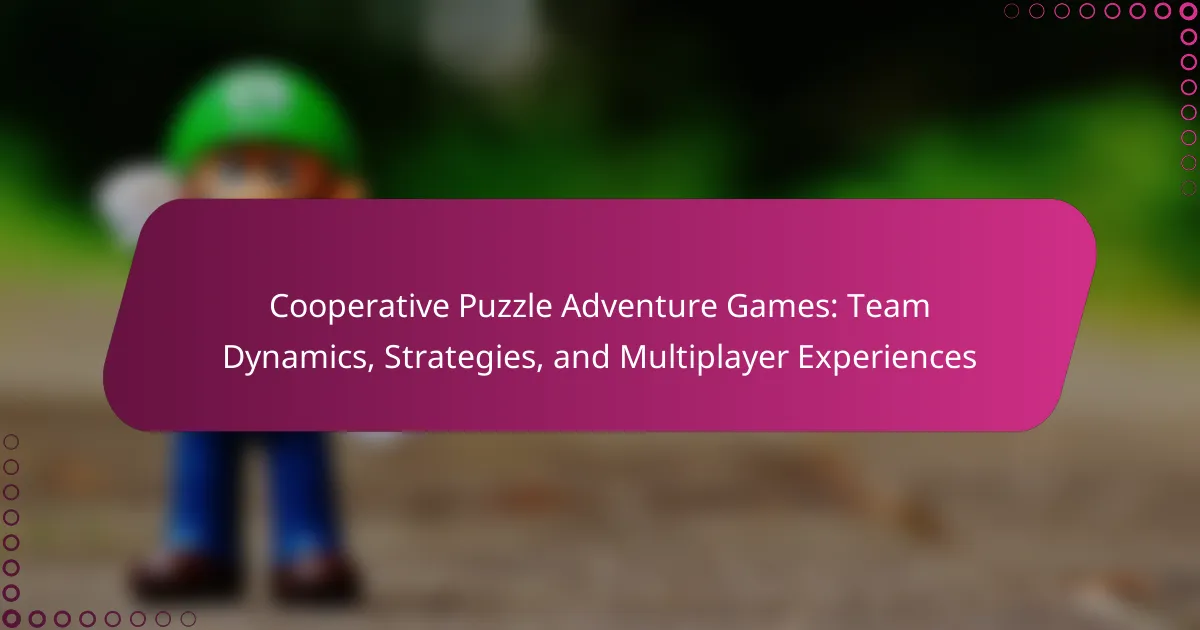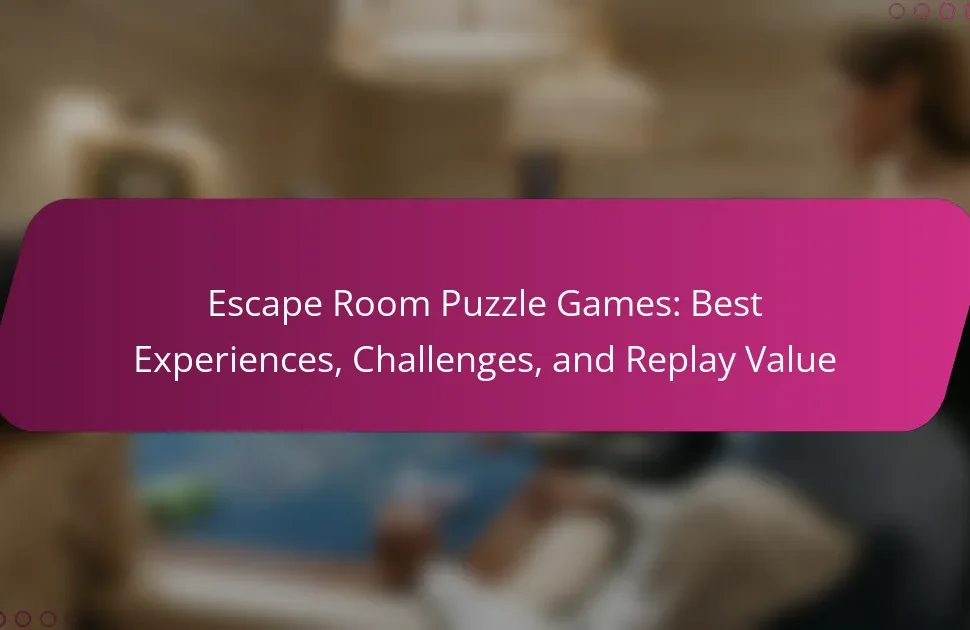Cooperative puzzle adventure games enhance teamwork and problem-solving skills through collaborative gameplay. This article explores effective strategies for communication, role assignment, and leveraging player strengths. It examines unique features that differentiate these games, the influence of player dynamics on performance, and emerging trends like cross-platform play and virtual reality integration. Engaging in these games fosters social connections and improves cognitive abilities, making each experience memorable.
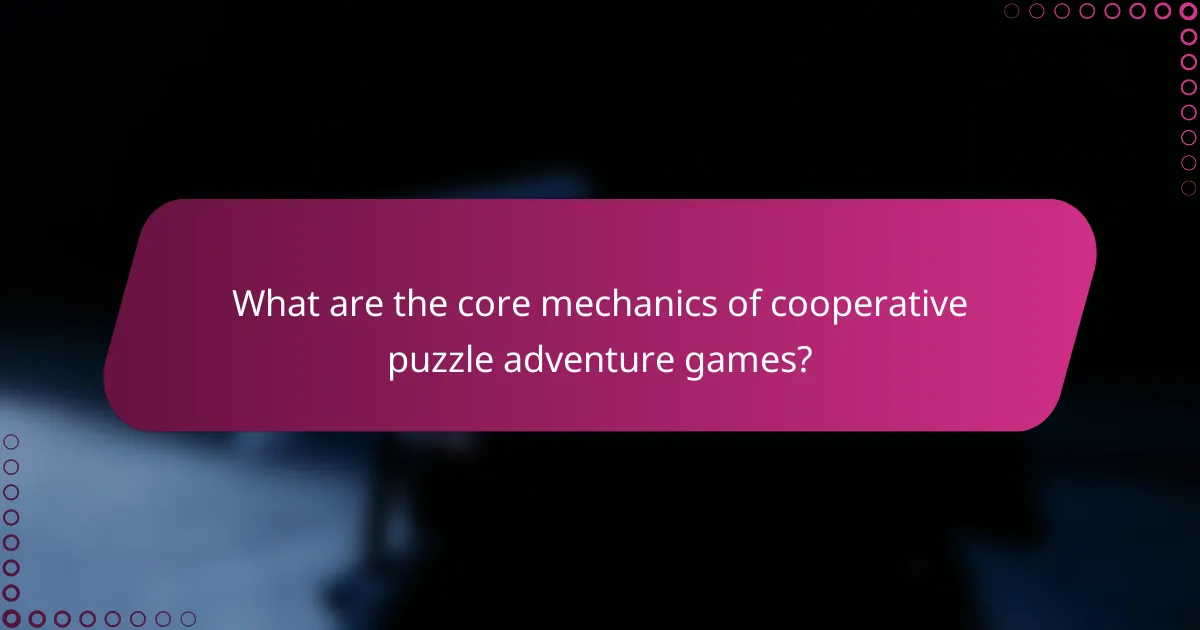
What are the core mechanics of cooperative puzzle adventure games?
Cooperative puzzle adventure games rely on teamwork, communication, and problem-solving to progress. Players must collaborate to navigate challenges, combining their unique skills to solve intricate puzzles. Effective strategies include role assignment, resource sharing, and leveraging each player’s strengths. Multiplayer experiences often enhance engagement through shared goals and interactive gameplay, fostering a sense of accomplishment as players overcome obstacles together.
How do teamwork and communication enhance gameplay?
Teamwork and communication significantly enhance gameplay by fostering collaboration and strategic thinking. In cooperative puzzle adventure games, players rely on clear communication to share insights and coordinate actions, leading to more effective problem-solving. Strong team dynamics create an environment where players can leverage each other’s strengths, improving overall performance. Furthermore, effective communication reduces misunderstandings, allowing teams to navigate challenges more efficiently and enjoy a richer gaming experience.
Which platforms are most popular for cooperative puzzle adventure games?
The most popular platforms for cooperative puzzle adventure games include PC, PlayStation, Xbox, and Nintendo Switch. These platforms offer diverse multiplayer experiences that enhance team dynamics and strategies.
PC remains a leading choice due to its extensive library and modding capabilities. PlayStation and Xbox provide strong online multiplayer support, fostering community engagement. Nintendo Switch stands out for its portability and local co-op features, appealing to players seeking social experiences. Each platform has unique attributes that cater to different gaming preferences.
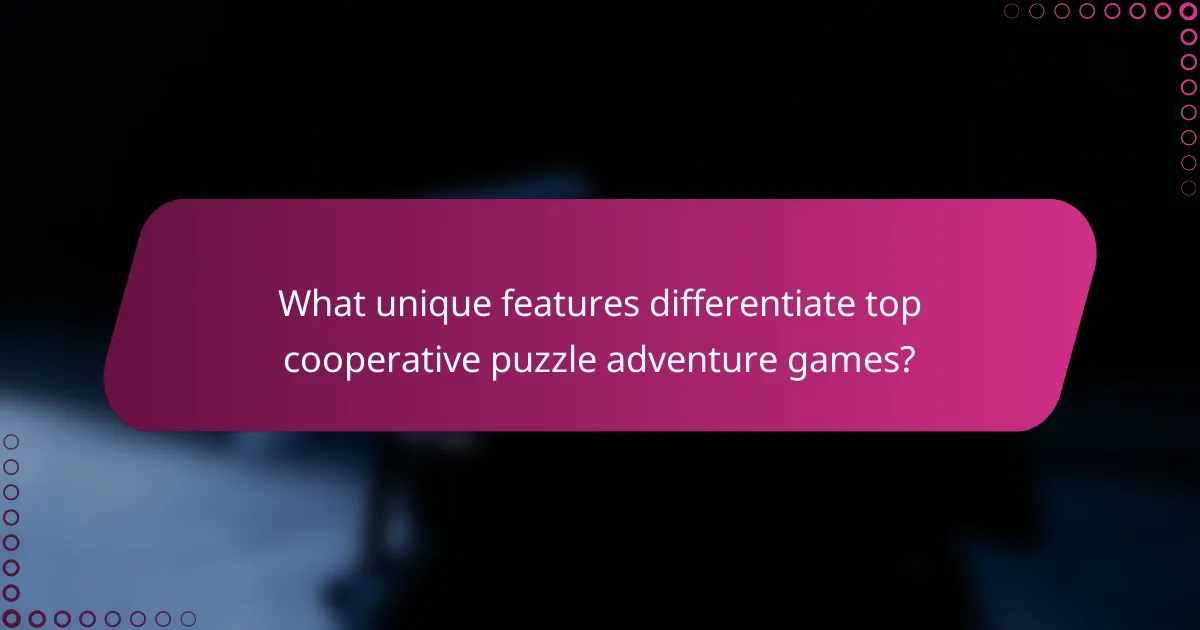
What unique features differentiate top cooperative puzzle adventure games?
Unique features that differentiate top cooperative puzzle adventure games include innovative gameplay mechanics, distinct visual styles, and engaging narrative elements. These games often emphasize teamwork, requiring players to communicate effectively to solve complex puzzles. Unique attributes like dual-character control or asymmetric gameplay enhance collaboration, making each experience distinct. Rare features, such as environment manipulation or real-time puzzle-solving under pressure, further set these games apart, creating memorable multiplayer experiences.
How do narrative elements influence player engagement?
Narrative elements significantly enhance player engagement in cooperative puzzle adventure games. They create immersive experiences that foster collaboration and strategy among players. Compelling storylines motivate players to work together, enhancing team dynamics and communication. Unique character arcs and plot twists maintain interest, encouraging players to explore and solve puzzles collectively. Additionally, narrative-driven objectives provide a sense of purpose, making gameplay more rewarding. Engaging narratives can lead to memorable multiplayer experiences that strengthen social bonds within the game.
What role do character abilities play in solving puzzles?
Character abilities are crucial in solving puzzles within cooperative puzzle adventure games. They enhance team dynamics and allow players to tackle challenges effectively. Different characters often possess unique attributes, such as strength, intelligence, or agility, which can be strategically utilized to overcome specific obstacles. For example, a character with enhanced problem-solving skills may decipher clues faster, while another with physical prowess can manipulate objects in the environment. This diversity in abilities fosters collaboration and requires players to communicate and strategize, ultimately enriching the multiplayer experience.

How do player dynamics affect team performance in cooperative games?
Player dynamics significantly influence team performance in cooperative puzzle adventure games. Effective communication, role distribution, and conflict resolution enhance collaboration. Teams that understand individual strengths can strategize better, leading to improved problem-solving and game progression. Positive social interactions foster motivation and engagement, directly impacting overall success.
What strategies promote effective collaboration among players?
Effective collaboration among players in cooperative puzzle adventure games relies on clear communication, defined roles, and strategic planning. Players should establish a common goal and utilize each member’s strengths to tackle challenges.
Encouraging active listening enhances team dynamics, allowing players to adapt strategies in real-time. Regular feedback loops help refine approaches, ensuring everyone remains aligned. Trust-building activities foster a supportive environment, motivating players to take risks and share ideas.
Utilizing in-game tools, such as shared inventories or communication features, can streamline collaboration. Players should also embrace flexibility, adjusting tactics as puzzles evolve. These strategies promote a cohesive multiplayer experience, enhancing overall enjoyment and success.
Which common challenges do teams face during gameplay?
Teams commonly face communication issues, role confusion, and time management challenges during gameplay. These obstacles can hinder collaboration and problem-solving. Effective communication is crucial; misunderstandings can lead to mistakes. Role confusion arises when team members are unclear about their responsibilities, impacting efficiency. Additionally, poor time management can result in rushed decisions, reducing overall performance. Addressing these challenges enhances team dynamics and improves gameplay experiences.
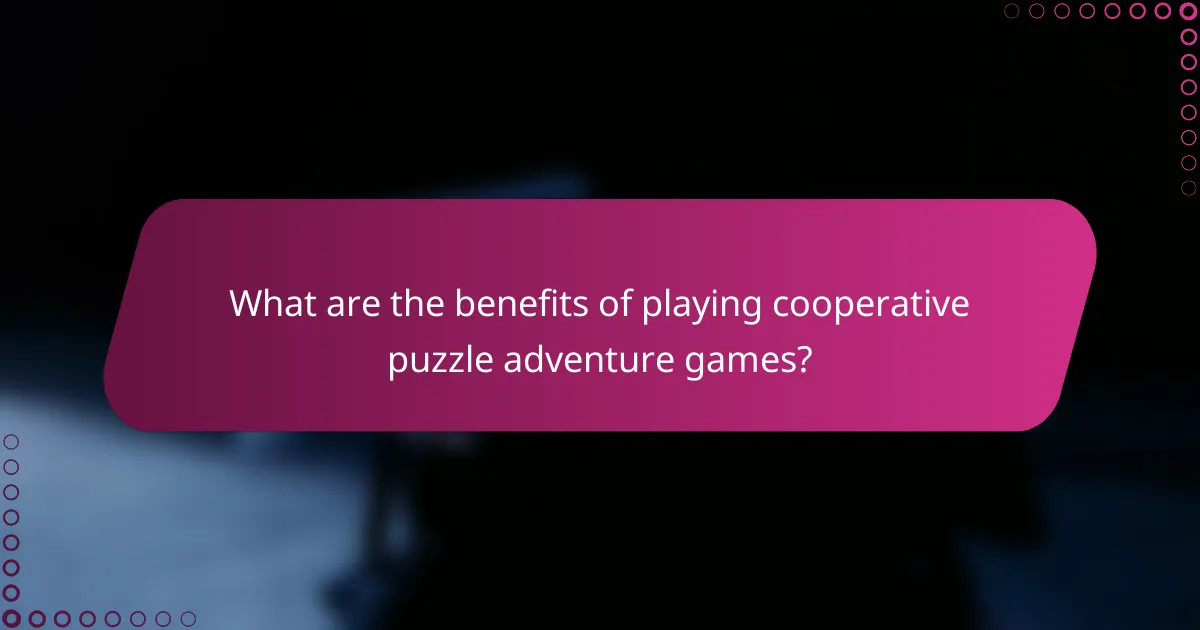
What are the benefits of playing cooperative puzzle adventure games?
Playing cooperative puzzle adventure games enhances teamwork, problem-solving, and communication skills. These games foster collaboration among players, encouraging them to strategize and share ideas. Players develop a sense of trust and reliance on one another, which strengthens group dynamics. Additionally, engaging in these games can improve cognitive abilities, as players must think critically and adapt to challenges together. Overall, the experience promotes social connections and enhances enjoyment through shared achievements.
How do these games foster social connections and teamwork skills?
Cooperative puzzle adventure games enhance social connections and teamwork skills through shared problem-solving experiences. Players collaborate to navigate challenges, fostering communication and trust. These games require strategic planning, encouraging players to delegate tasks based on individual strengths. As a result, participants develop a deeper understanding of each other’s capabilities, which strengthens their bonds.
What cognitive skills are developed through cooperative gameplay?
Cooperative gameplay enhances cognitive skills such as problem-solving, communication, and critical thinking. Players develop these skills by collaborating to solve challenges and strategize effectively. Team dynamics in cooperative puzzle adventure games require players to share ideas and perspectives, fostering creativity. As a result, players improve their ability to analyze situations and make decisions collectively.
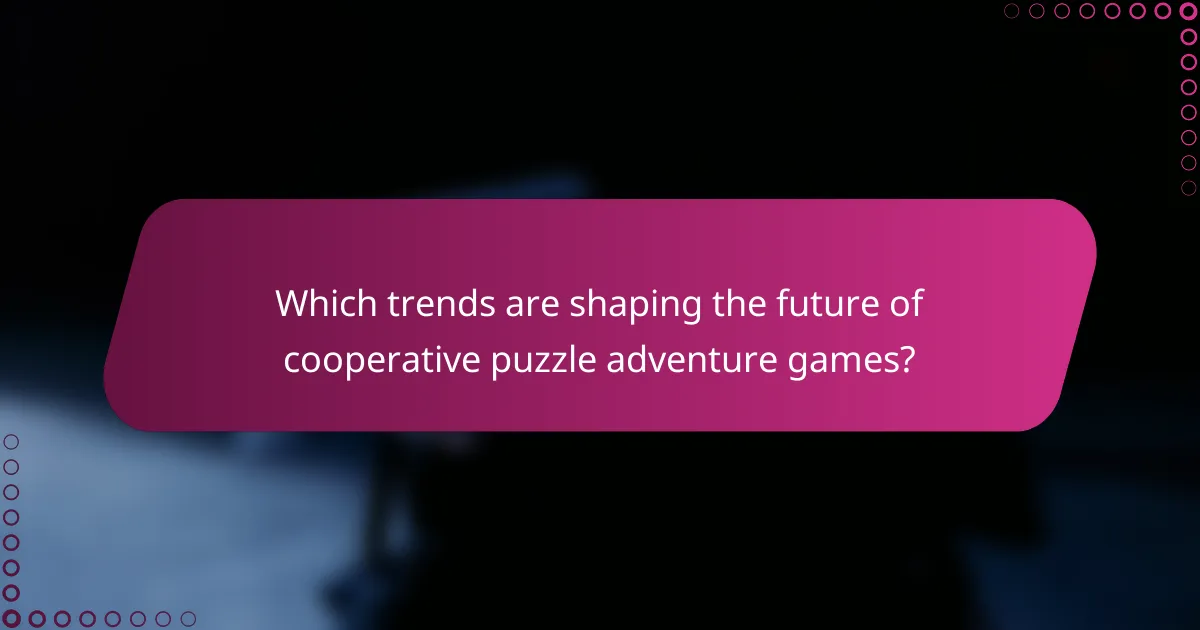
Which trends are shaping the future of cooperative puzzle adventure games?
Cooperative puzzle adventure games are increasingly shaped by immersive storytelling, innovative mechanics, and enhanced social interaction. Players seek deeper emotional connections and shared experiences.
Emerging trends include cross-platform play, allowing diverse player groups to collaborate seamlessly. Enhanced AI-driven puzzles adapt to player strategies, fostering unique challenges.
Community-driven content creation is on the rise, enabling players to design and share their puzzles. This trend enhances replayability and community engagement.
Lastly, virtual reality integration offers immersive environments, transforming traditional gameplay into a more engaging experience. These trends collectively redefine cooperative gameplay dynamics.
How is technology influencing multiplayer experiences?
Technology significantly enhances multiplayer experiences in cooperative puzzle adventure games by fostering communication, collaboration, and strategic gameplay. Advanced online platforms enable real-time interaction, allowing players to share ideas and solve challenges together. Enhanced graphics and immersive environments create engaging settings that encourage teamwork. Additionally, integrated tools track player performance and progress, facilitating strategic planning and decision-making. These technological advancements lead to richer, more dynamic gaming experiences that deepen player connections and engagement.
What emerging genres are incorporating cooperative puzzle elements?
Cooperative puzzle adventure games are increasingly incorporating genres like escape room simulations, narrative-driven experiences, and platforming challenges. These genres emphasize teamwork and problem-solving, enhancing multiplayer dynamics. Games like “It Takes Two” and “Portal 2” exemplify this trend, blending cooperative mechanics with engaging narratives. Emerging titles often feature unique attributes like asymmetric gameplay, where players have different roles and abilities, fostering collaboration. Such innovations create diverse multiplayer experiences that keep players engaged and invested in teamwork.
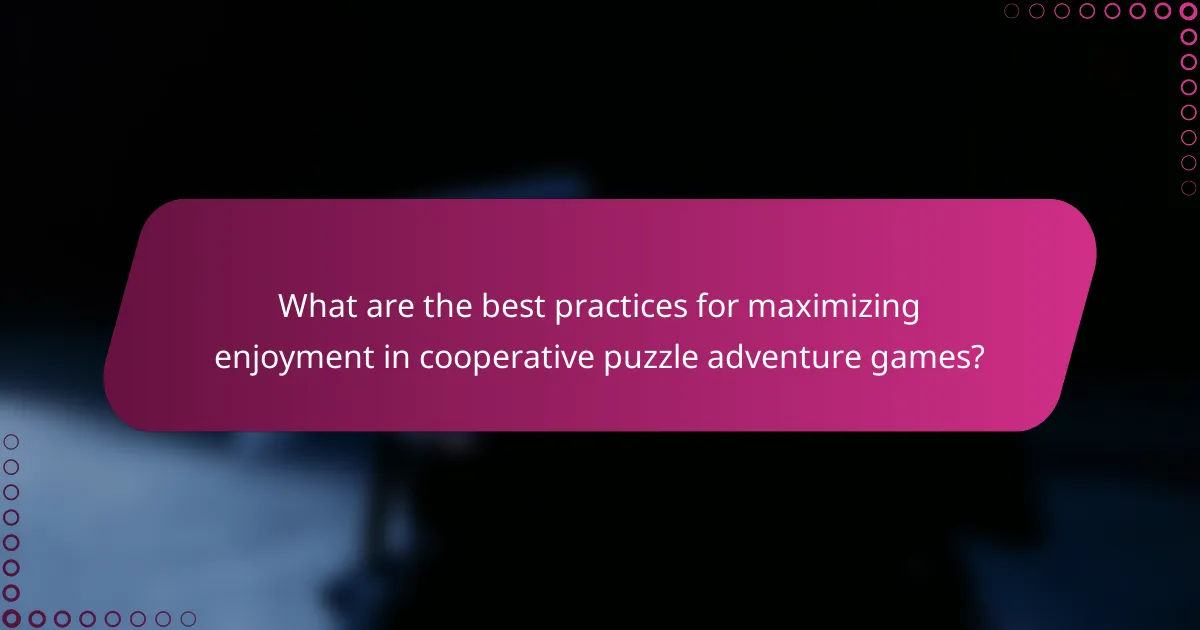
What are the best practices for maximizing enjoyment in cooperative puzzle adventure games?
Effective communication, defined roles, and strategic planning maximize enjoyment in cooperative puzzle adventure games. Players should establish clear communication to share ideas and solve challenges efficiently. Assigning roles based on individual strengths enhances teamwork. Incorporating a mix of problem-solving strategies keeps gameplay engaging and dynamic. Finally, taking breaks to discuss progress fosters collaboration and prevents frustration.
What common mistakes should players avoid during gameplay?
Players should avoid communication breakdowns, neglecting roles, and rushing decisions during gameplay. Effective teamwork relies on clear dialogue and understanding each member’s strengths. Common mistakes include failing to strategize collaboratively, ignoring environmental clues, and underestimating challenges. These errors can hinder progress and reduce enjoyment.
How can players effectively strategize for complex puzzles?
Players can effectively strategize for complex puzzles by enhancing communication, dividing tasks, and leveraging individual strengths. Clear dialogue fosters collaboration and ensures everyone understands the puzzle’s objectives. Assigning roles based on team members’ skills can streamline the problem-solving process. Additionally, utilizing a trial-and-error approach allows teams to explore various solutions, adapting strategies as needed. Regular check-ins during gameplay can help maintain focus and adjust tactics in real-time.
